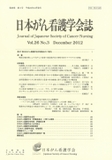Japanese
English
- 販売していません
- Abstract 文献概要
- 参考文献 Reference
- サイト内被引用 Cited by
要旨
本研究の目的は乳がん患者の診断から初回治療終了までの配偶者の認識と対処行動を明らかにすることである.研究方法は,乳がんの診断を受け初回治療終了までの患者の配偶者6名を対象に半構成的な質問による面接法を用いて行った.分析方法は,面接内容から逐語録を作成し,妻の乳がん診断から初回治療終了までの配偶者の認識と対処行動について内容分析を行った.研究者の所属施設の倫理委員会の承認を得て行った.分析の結果,乳がん患者の診断から初回治療終了までの配偶者の認識として≪乳がんの診断は思いがけないショックな出来事≫≪乳がんは,病状が初期で治療可能ならば深刻に考えない≫≪乳がんは再発や転移が心配であり,医師による専門的な治療が必要である≫≪妻が元気かどうかにより夫の気持ちに影響する≫≪乳がんによる女性特有のことについて夫は話しにくい≫など8カテゴリーが抽出された.対処行動として,≪病気に関する情報収集をする≫≪妻の気持ちを安定させるために努力する≫など4カテゴリーが抽出された.乳がん患者の配偶者は,乳がん罹患や治療に伴う妻の変化においてわからないことや察しきれないことに戸惑いを感じながら,見守り刺激しないよう努力し,夫として妻をサポートする役割を果たしたいと模索している姿が明らかになった.配偶者は乳がん患者である妻をサポートする存在として意識しており,配偶者が妻をサポートできる能力を強化する援助の必要性が示唆された.
Abstract
This study aimed to identify the recognition and coping behavior of spouses of breast cancer patients, from the time of cancer diagnosis to the completion of initial treatment. We conducted semi─ structured interviews with 6 husbands whose wives had received a diagnosis of breast cancer and undergone initial treatment. The interviews were transcribed verbatim and analyzed using a content analysis approach to examine the husbands' recognition and coping behavior. The study was conducted with the approval of the research ethics committees at our affiliations. As a result, 8 categories were extracted in relation to the husbands' recognition during the period from diagnosis to the completion of initial treatment. These categories included: 'being shocked at the wife's breast cancer diagnosis, which was unexpected', 'not taking the diagnosis too seriously if the wife's breast cancer is in an early, treatable stage', 'being aware of the possibility that breast cancer could recur or metastasize, thereby requiring professional treatment ', 'realizing that their emotions are affected by the wife's condition', and ' finding it difficult to talk about breast cancer and associated health issues specific to women'. As for coping behavior, 4 categories were extracted. Among them were: 'collecting information on breast cancer and related topics' and 'making efforts to ease the wife's mind'. The findings showed that the husbands of breast cancer patients watched over their wife and were careful not to disturb or provoke her, while feeling confused when faced not only with changes in their wife because of cancer and its treatment, but also with difficulties in understanding the wife's feelings and situation. Husbands considered it their role to be there for their wife, and looked at possible ways to support her. This suggests the need to provide nursing assistance to help husbands enhance their ability to support their wife with breast cancer.
Copyright © 2012, Japanese Society of Cancer Nursing All rights reserved.


